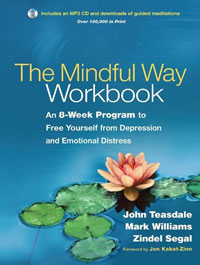 228 pages
228 pages7 CE credits
Course Enrollment
$190.00
Add to Cart
All exams are taken online. The exam for this course will be available in "My Courses" immediately upon enrollment. Note the book is not included.
The book is available for purchase from Amazon.
As an Amazon Associate we receive a rebate from qualifying purchases.
THE MINDFUL WAY WORKBOOK
An 8-Week Program to Free Yourself from Depression and Emotional Distress
John Teasdale, Mark Williams, and Zindel V. SegalForeword by Jon Kabat-Zinn
Guilford Press, 2014
DESCRIPTION
This carefully constructed workbook shows readers and their patients struggling with depression and other emotional difficulties how to build a mindfulness practice in eight weeks. It provides specific exercises to try on a daily and weekly basis; self–assessments; reflection questions with spaces to jot down notes; and worksheets for keeping track of progress. The Workbook follows the sequence of the authors' evidence–based MBCT program in a self–help format.
Guided meditations are provided on the accompanying MP3 CD and are also available as audio downloads.
The reader will be able to:
• Describe the Mindfulness-Based Cognitive Therapy (MBCT) strategies in helping to develop effective treatment for persistent anxiety and depression
• Use the book and accompanying audio downloads to structure a MBCT program for clients
• Compare the "Doing Mode" with the "Being Mode" and be able to strategize a balance for the two
• Conduct thought exercises, such as sitting meditation and stretch and breathe meditation
• Recognize early warning signs of relapse and devise questions to recall patterns that may have given these signs (the book links a downloadable questionnaire guide)
AUTHOR
John Teasdale, PhD, held a Special Scientific Appointment with the United Kingdom Medical Research Council's Cognition and Brain Sciences Unit in Cambridge. He is a Fellow of the British Academy and the Academy of Medical Sciences. Since retiring, Dr. Teasdale has taught mindfulness and insight meditation internationally. He continues to explore and seek to understand the wider implications of mindfulness and meditation for enhancing our way of being.
Mark Williams, DPhil, is Emeritus Professor of Clinical Psychology at the University of Oxford, having been Wellcome Principal Research Fellow at Oxford from 2003 to 2012 and at Bangor University from 1991 to 2002. He is a Fellow of the British Psychological Society, the Academy of Medical Sciences and the British Academy. Now retired, he teaches mindfulness to teachers-in-training across the world, and explores, with colleagues, how mindfulness might be used in evidence–based public policy.
Zindel V. Segal, PhD, is Distinguished Professor of Psychology in Mood Disorders at the University of Toronto–Scarborough. He is Director of Clinical Training in the Clinical Psychological Science Program and is also Professor in the Department of Psychiatry. Dr. Segal has conducted influential research into the psychological processes that make certain people more vulnerable than others to developing depression and experiencing recurrent episodes. He actively advocates for the relevance of mindfulness-based clinical care in psychiatry and mental health.
"The authors are leading experts in developing the scientific theories and experiential skills of how mindfulness can help to disrupt the ruminative cycle that perpetuates depression....This book is written and arranged in such a way that the layman with no prior knowledge of cognitive theory of depression can easily understand why and how MBCT can be of benefit to them....This workbook is highly recommended to anyone who is interested in MBCT for self–improvement or self–help in coping with depression, as well as to mental health professionals who want to learn mindfulness skills for personal enhancement or for teaching their own patients. I have now incorporated this workbook as a companion resource into my own practice of cognitive–behavioral therapy. My daily practice of mindfulness skills has also strengthened my personal ability to develop moment–to–moment case conceptualizations for my patient's problems during each therapeutic encounter"
--International Journal of Social Psychology
"I consider MBCT to be an effective means of preventing and treating depression and enhancing emotional well–being. This workbook gives practical advice for applying the principles of MBCT in your life. I recommend it highly."
--Andrew Weil, MD, author of 8 Weeks to Optimum Health and Spontaneous Happiness
"Wisdom, illuminated and applied! We could ask for nothing more from three of the world's most gifted and caring clinicians, who provide us with a clear and practical guide to understanding and strengthening the mind. This workbook is a generous gift that can help you relieve depression and anxiety, improve your health, and enhance your way of being in the world."
--Daniel J. Siegel, MD, author of The Mindful Brain and The Mindful Therapist
"Fantastic".[It] functions as a trusted friend, counselor, and guide."
--from the Foreword by Jon Kabat–Zinn, PhD
"What could be more fabulous than this? An evidence–based treatment for depression translated into a workbook that everyone can use. This is a treatment that has circled the globe for a reason–it works. Fortunately, the authors who translated the treatment into a workbook are the very people who developed the treatment in the first place; all three are expert clinicians and scientists. My advice: 'Try this.'"
--Marsha M. Linehan, PhD, ABPP, Professor and Director Emeritus, Behavioral Research and Therapy Clinics, University of Washington; developer of DBT
"Three of the world's leading authorities on psychotherapy and mindfulness have developed a workbook of great clarity and value. It outlines an easy–to–follow, step–by–step program for how to train our minds out of repetitive loops and find states of peace."
--Paul Gilbert, PhD, Centre for Compassion Research and Training, University of Derby, United Kingdom
ISHK CE at Home
1702-L Meridian Ave., #266
San Jose, CA 95125-5586
This website uses cookies to ensure you get the best experience on our website. Learn more
